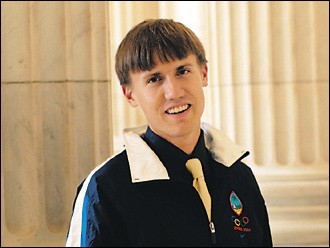Guam Press Secretary’s Olympic Struggle

When middle-distance runner Neil Weare was selected in the spring to represent Guam at the Summer Olympic Games in Athens, Greece, the Capitol Hill staffer could not have imagined the legal fiasco that lay ahead.
“An athlete’s most important person beside him should be [his] coach, not a coach and a team of lawyers,” said Weare, press secretary to Del. Madeleine Bordallo (D-Guam).
Unfortunately for Weare, who hails from Santa Rita, Guam, that turned out to be precisely the case.
Initially, Weare, who won both gold and silver medals at last year’s South Pacific Games, was selected in April by the Guam Track and Field Association to compete in the 1,500-meter men’s preliminary race at the Olympics as a representative of the tiny Pacific island U.S. territory.
But when it came to receiving the necessary certification from the Guam National Olympic Committee — usually “a really mundane” step, Weare said — he ran into a snag.
“They basically dragged on their certification for three months,” he said.
Then in mid-July, the unthinkable happened. The committee informed him they’d chosen another runner with faster times — only those times had been earned after the deadline for selection had passed.
To add an element of “political intrigue” to the decision, rumors had circulated that GNOC’s president, Ric Blas, a “strong Republican,” may have been motivated by partisan politics, Weare said. Weare noted that his former employer, Guam Senate Majority Leader Lou Leon Guerrero (D), had led an earlier successful effort in the Guam Legislature to reject Blas’ nomination as director of customs and quarantine.
Weare wasn’t about to let his life-long Olympic dream slip away, however.
He hired a pair of attorneys (ironically, both nephews of Bordallo’s) and appealed GNOC’s ruling to the “Supreme Court of Sport,” the International Court of Arbitration for Sport in Switzerland, on Aug. 2.
“It’s the same body that did all the drug cases,” said Weare. “It’s kind of ridiculous that my case had to go to that level to be decided.”
Given that the initial federation selection deadline had been April 1 — April Fool’s Day — and that the final decision was expected from the court on Aug. 13 — a Friday — Weare said he “wasn’t too optimistic at that point that it was going to go [his] way.”
But fate was smiling on him.
At 3:30 a.m. on the opening day of the Olympics, Weare was awakened by his attorneys’ telephone call, delivering the good news: The court had overruled the national Olympic committee’s decision. Roughly 36 hours later, he boarded a Lufthansa flight to Greece.
Still, the battle wasn’t over. Not only did his committee discourage him from coming until his credentials were secured (a move that most likely would have meant he wouldn’t have competed), but once he arrived it effectively refused to acknowledge his existence.
“They basically said, ‘Until you get your accreditation we are not going to recognize you as part of the team,’ while at the same time they were delaying my accreditation,” he said, adding that the accreditation didn’t come through until just three days before the race.
“My attorneys had to work the lines of communication … to make sure that the [Court of Arbitration for Sport] decision was followed through,” he said.
All in all, Weare racked up about $11,000 in legal fees, a sum he’s hoping the Guam National Olympic Committee will have to pay.
Finally at 7:55 p.m. Aug. 20, Weare — one of only four athletes to compete for Guam — crouched into position for his hard-earned moment in Olympic history.
The late departure date had left Weare without time “to climatize,” which translated into his “lungs … really burning from the dryness during the race.”
Still, “I ended up passing a runner with about 500 meters to go, so I at least beat someone,” he laughed, adding that he preferred to tell people he finished second, omitting the fact that it was second to last.
“It went really well under the circumstances,” Weare noted cheerfully.
After the closing ceremonies, Weare, who said he’d “definitely struggled as much as any athlete to get there,” treated himself to “a true recess” on the Greek islands of Santorini, Paros and Hydra, before flying back to the nation’s capital last week.
Now Weare said he plans to use his political skills to ensure that future Guam athletes “can count on the national Olympic committee upholding the Olympic charter,” and he wants to work with his federation and other federations to bring about a change in the GNOC leadership.
“They changed it at the 11th hour, and that’s not a way to have athletes prepared,” he said.
Through it all, Weare says his boss was extremely supportive. When his residency status was questioned by GNOC, Bordallo wrote letters on his behalf. For much of the year prior to the Olympic Games, Weare was allowed to take two to two-and-a-half hour lunches to train, switching to morning and evening workouts once the weather “became hot.”
“We were 100 percent behind him through his ordeal,” said Bordallo. “He made the most of it despite the fact he was coolly received in the beginning.”
As for whether the 24-year-old Weare will return to the starting block at the 2008 games in Beijing, he says he’s “not going to count anything out” but wants “to try some other things for awhile.”
Such as?
The triathlon and maybe “in a year or so” law school, he said.
And there’s still his lesser-known passion for Latin music and salsa to attend to.
“Running really can take up a lot of your time,” he noted with a chuckle. “Now I have time to really focus on my dancing.”





